It’s Time to Release Your Money Blocks!
How can I start removing money blocks? To remove money blocks, start by identifying if you have any of the most common money blocks.
Money blocks often include fear of success, guilt around wealth, or beliefs that making money is hard. These money blocks often come from childhood experiences or cultural messages, and they can quietly hold you back. Next, start doing consistent money mindset work such as journaling, affirmations, and guided visualizations to help rewire those beliefs.
As you shift your mindset, making money starts to feel more natural and aligned with who you are. For more practical tactics and guidance, keep reading!
Written By Tiffany Woodfield, Financial Coach, TEP®, CRPC®, CIM®

Summary of Key Points
- Balancing giving and receiving helps you shift from scarcity to abundance.
- Money blocks are deep-rooted beliefs from childhood or culture that limit financial growth.
- Common blocks include thinking money is bad, believing success is unreachable, or feeling unworthy of wealth and financial abundance.
- Six keys to removing blocks include: clear negative energy, release grudges, practice gratitude, embrace self-care, set goals, and visualize abundance.
- Addressing money blocks improves decision-making and makes building wealth feel natural and achievable.
Does It Feel Like a Struggle?
Are you struggling to reach your most important financial goals despite your best efforts?
Or are you just not able to enjoy the wealth you’ve already built?
If so, you might be dealing with subconscious barriers known as money blocks. By understanding and removing money blocks, you’ll be able to unlock the abundance you yearn to experience.
And don’t worry, you’re not alone. In fact, if you worry about money, you have plenty of company.
According to a survey done by Bank Rate in 2025, 43% of respondents said that money “negatively affects their mental health…causing anxiety, stress, worrisome thoughts, loss of sleep, depression and other effects.”
That’s a lot of people lying awake at night worrying about money!
So in this post, I’m going to cover 6 tips to help you remove money blocks that you’ve had for years so you can feel calmer and more content around money. But first, I’ll go over what a money block is and why getting them out of your psyche matters so friggin’ much.
What Is a Money Block?
A money block is a belief you hold about money that prevents you from achieving financial freedom.
Often, these blocks operate on a subconscious level and are formed during your childhood. As a child, your mind is like a sponge, absorbing everything and accepting anything you’re told as truth.
Fast forward 20 to 30 years, and you may find yourself carrying these outdated beliefs that no longer serve you.
For example, imagine you learned from your parents that money was scarce.
You diligently saved your allowance, researching and dreaming about a special item you wanted. After a long wait, you finally had enough and brought it home, only for your mom to say, “Take that back. You don’t ‘need’ that. People are starving, and you need to save your money.”
Now, even in your 50s (long after her passing), every time you buy something, guilt washes over you.
Does that sound familiar?
Early programming has created a money block in the form of your belief that money is scarce, leaving you afraid of losing what you have. You are now unable to make financial decisions that foster true financial freedom.

It’s OK to Want More Money
Before we dig deeper, let’s get one thing clear: it’s okay to want more money!
In fact, it’s perfectly normal. Money is just a tool that allows you to do the things in life that you want to do. In previous times, chicken and salt were used as ways to trade.
And you wouldn’t feel bad about wanting more chickens or more salt.
So why should you feel bad about wanting more money?
Common Money Blocks Potentially Holding You Back
The most common money blocks are as follows:
- Money is bad, and wanting more money is selfish
- Money is for other people
- I will never have enough money
- Everything is getting more expensive
- Only the rich get richer
- Money doesn’t buy you happiness
- I will never be successful
- I am not creative or smart enough to be financially free
Do any of these resonate with you? Do you say any of these things to yourself? If so, then these six ways to remove money blocks will help!
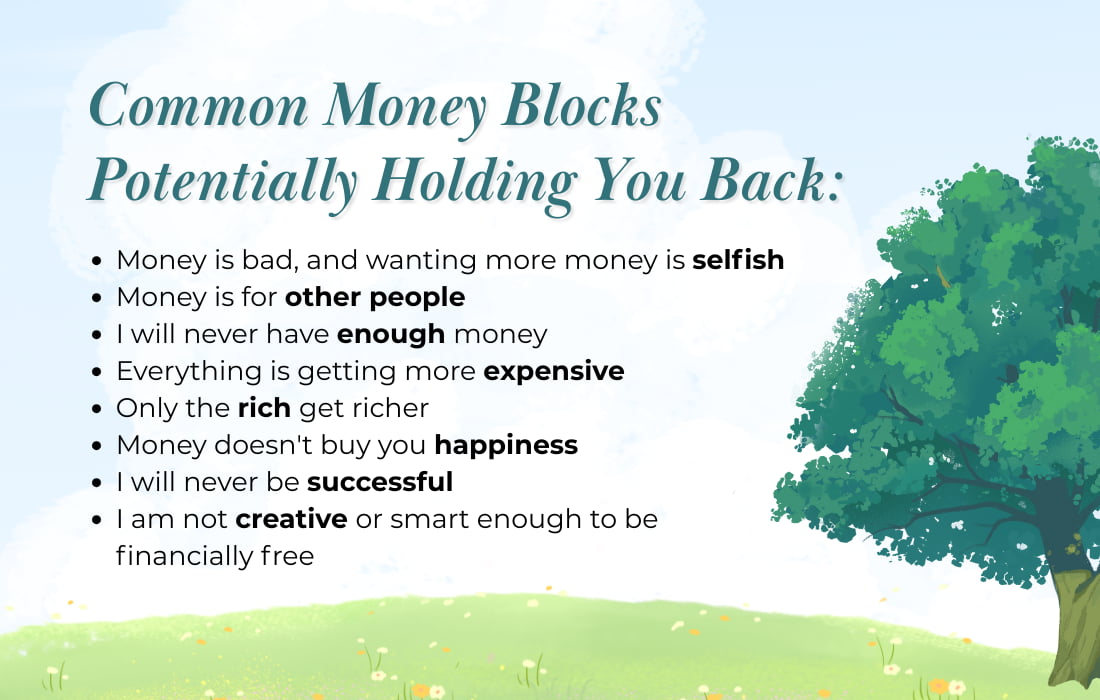
6 Keys for Removing Money Blocks You’ve Had Forever
1 . Clear Negative Energy
Our minds are powerful magnets, attracting whatever energy we project into the universe.
This means that if you consistently think negative thoughts—like “I will never be successful” or “nothing good ever happens to me”—the universe will reflect those beliefs back to you. Have you ever caught yourself saying, “I am bad with money,” only to be confirmed by a negative experience soon after?
Did you ever consider that you created the experience of being bad with money?
It is like you programmed yourself to be bad with money. It really is that powerful, and the opposite is true as well. By clearing negative energy and reshaping your thought patterns, you begin to attract more positive outcomes and opportunities into your life.
You get what you expect!
2. Release Grudges
Holding onto a grudge is a form of judgment that keeps you in a victim mentality.
It’s important to remember that you create your own reality and have the power to choose how you respond to situations. By clinging to a grudge, you’re surrendering your power to someone else, essentially signaling to the universe that this negative feeling is more important than the life you wish to create.
Releasing grudges gives you a fresh start, allowing you to shift your focus and begin attracting the positive experiences and opportunities you desire.
3. Practice Gratitude
I know we’ve all heard the saying “practice gratitude,” but many of us may not fully appreciate why this practice is so powerful.
By expressing what you are grateful for—no matter how small—you send a message to the universe about what you want more of in your life.
Sometimes, our logical minds crave something more concrete than just the idea of practicing gratitude. If that resonates with you, imagine sending a letter to the universe.
Here’s an example of what you might write:
Dear Universe,
I am grateful for my health, my family, and the opportunities around me.
Thank you for supporting me and creating a world where I can learn and grow stronger, empowering me to create the life I desire.
Kindest regards,
Me
This exercise can help solidify your intentions and reinforce a positive mindset.
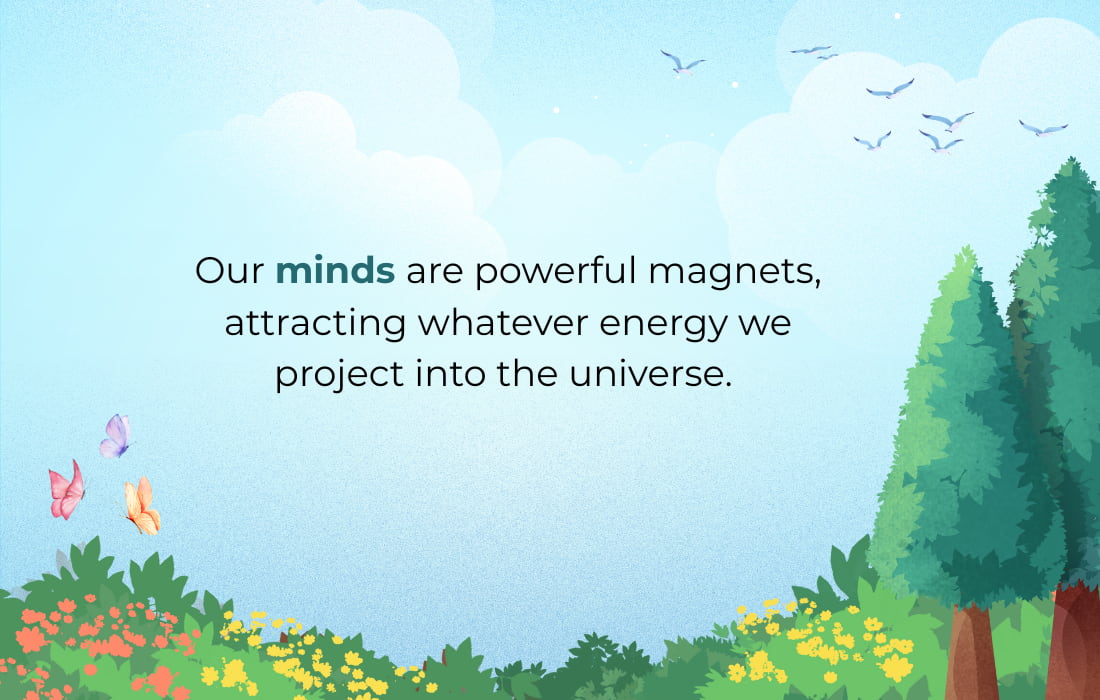
4. Embrace Self-Care for Financial Growth
Embracing self-care in the form of financial growth involves taking care of your finances now while preparing for a prosperous future.
It’s essential to focus on emotional well-being by addressing and removing any limiting beliefs about money that may hold you back. Simultaneously, you should build your knowledge around practical tools like budgeting, saving, and investing.
By nurturing both your emotional and financial health, you’ll create a strong foundation that aligns you with the financial freedom and success you seek.
5. Set and Write Your Goals
When setting and writing your goals, it’s essential to create clear, specific, and realistic objectives, including a timeline.
Start by identifying a larger, long-term goal, and then break it down into smaller, manageable goals that keep you motivated and on track.
For example, your long-term goal could be: “I want a work-optional lifestyle in 10 years, where I can choose how to spend my time.”
In contrast, a short-term goal might be: “I would like to take a trip to Italy in July.”
Once you’ve established these goals, you can calculate how much money you need for your trip, which will generate excitement as your travel date approaches.
Similarly, for your long-term goal, determine how much you need to save each year to ensure that, in 10 years, work can be optional for you.
Compound Interest Calculator for Assessing Long-Term Financial Goals
6. Visualize and Meditate on Abundance
To visualize and meditate on abundance, start by getting specific and clear about what abundance means to you.
Remember, everyone’s vision of a fulfilling life is unique, and we don’t all want a “cookie-cutter” existence. Once you have a vivid picture of the abundance you desire, close your eyes, take a few deep breaths, and visualize yourself already living that life.
Reflect on how it feels to be in that state of abundance.
After establishing this clear image, allow your mind to quiet and focus on your breath, staying in a state of peace for several moments until the mental chatter subsides.
Before opening your eyes and transitioning back to your day, revisit the picture you created at the start, affirming that you are actively taking steps toward this vision.
For me, I envision myself in a state of flow, where my mind is calm and my movements are unhurried. Even as the world buzzes around me, I remain at peace, surrounded by lush greenery, a serene lake, the songs of birds, and the gentle drift of clouds.
The most significant transformation I notice is in my attitude, embracing a sense of tranquility.
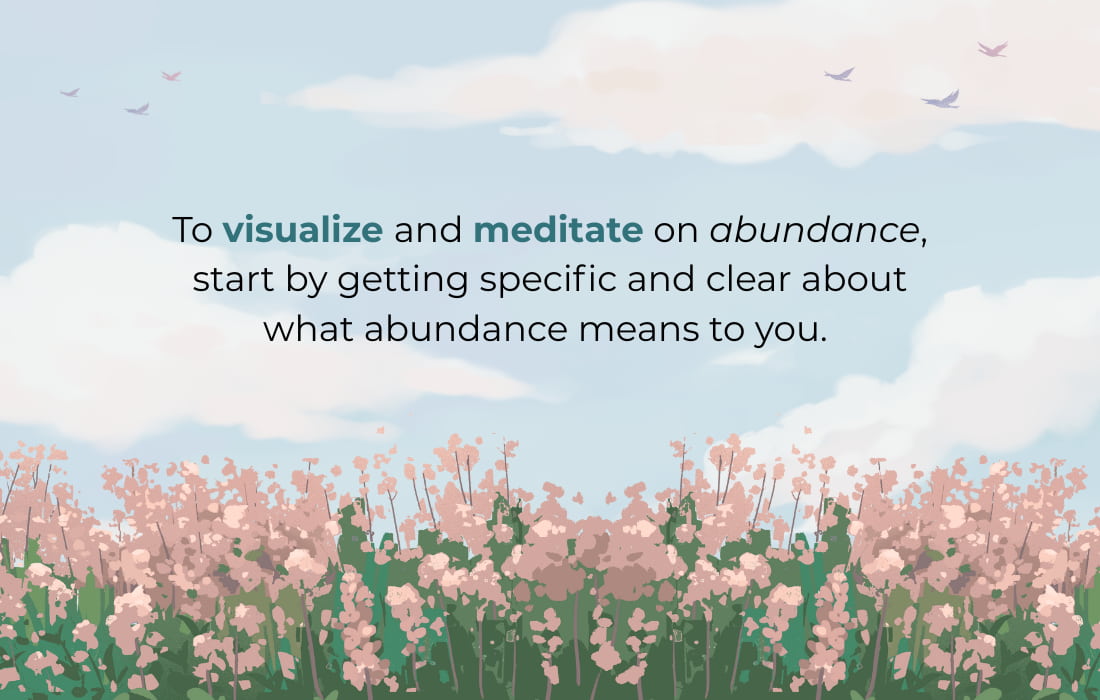
Common Money Blocks and How to Overcome Them
| Money Block | How It Shows Up | Key Strategy to Remove It |
|---|---|---|
| Money is bad / wanting more is selfish | Feeling guilty when spending or earning | Practice gratitude for money as a tool for good |
| I will never have enough | Constant fear of scarcity | Visualize abundance and set clear goals |
| I don’t deserve success or wealth | Turning down opportunities, undercharging | Write down reasons you deserve financial abundance |
| Money is for other people | Envy or resentment toward wealthy people | Reframe beliefs through affirmations and self-worth work |
| Money doesn’t buy happiness | Avoiding financial growth opportunities | Focus on how money can support your values and goals |
| I am bad with money | Avoiding budgeting or investing | Learn basic financial skills and track small wins |
How Money Blocks Affect Self-Worth
As discussed earlier, money blocks are negative thoughts that obstruct your path to financial freedom.
They diminish your self-worth and undermine your belief in your ability to achieve financial success, making you feel undeserving of wealth. This mindset not only affects your energy but also holds you back from taking meaningful action toward increasing your income.
For instance, if you believe you don’t deserve more money, how challenging do you think it would be to face your fears and ask for a promotion? Or how motivated would you feel to start a side hustle?
The unsettling reality of money blocks is that they can keep you stagnant, often without your awareness.
It is easier to blame others or your circumstances, which are beyond your control, than to confront your fears. But remember, you do have the power to release these blocks and pave the way for greater success in your life.
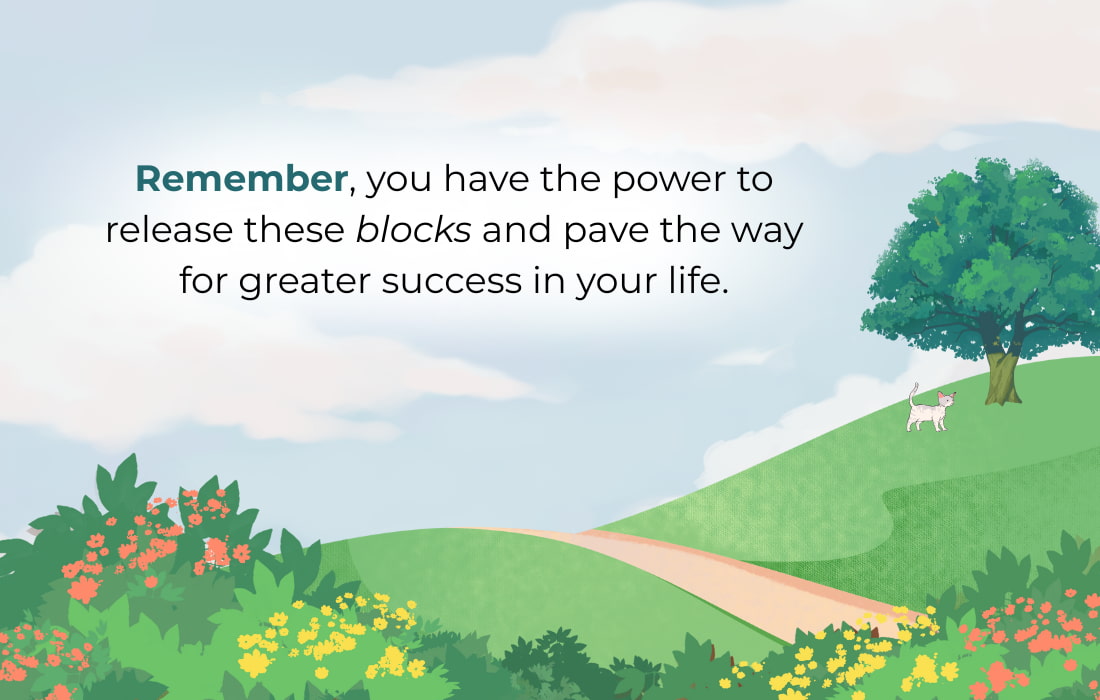
How to Believe that You Deserve Money!
To believe you deserve money, the first step is acknowledging any beliefs you hold that suggest you don’t deserve it.
Start by writing these beliefs down on a piece of paper, then assign a percentage to each one, indicating how strongly you believe in these negative money blocks.
Next, challenge each belief by writing out reasons why they aren’t true and why you absolutely deserve financial abundance. The key here is not to simply bury these money blocks; you need to confront the “elephant in the room” to diminish its power.
While transformation won’t happen overnight, cultivating curiosity about your worthiness and the positive impact you can create with more money will help diminish those limiting beliefs.
How Undefined Goals Act as Money Blocks
Imagine you’re dining at a nice restaurant and you don’t tell the waiter what you want to order.
You can’t reasonably be annoyed when they serve filet mignon and you’re vegetarian.
Similarly, if you haven’t articulated your financial goals, this lack of clarity creates obstacles to achieving financial success. Without specific goals, you fail to provide the universe with the instructions needed to guide you, leaving you unaware of the “ingredients” holding you back from your desired financial outcomes.
Why Balancing Giving and Receiving Is Critical
Have you ever heard the term “over-giver”?
This often refers to someone who habitually gives to others—be it through helpful advice, gifts, or their time and energy. This pattern typically stems from a person who is uncomfortable accepting help; they may feel unworthy, believing it’s a sign of weakness or a loss of control.
If you identify with this “over-giver” complex, it’s crucial to recognize that this mindset highlights a limiting belief about your worthiness to receive support. Remember, accepting help is beneficial for both parties; when someone offers assistance and has the capacity to give, it creates a win/win situation.
Unfortunately, today’s society often divides people into two camps: givers and takers.
It’s important to acknowledge which camp you belong to and actively work toward balancing giving and receiving in your life.
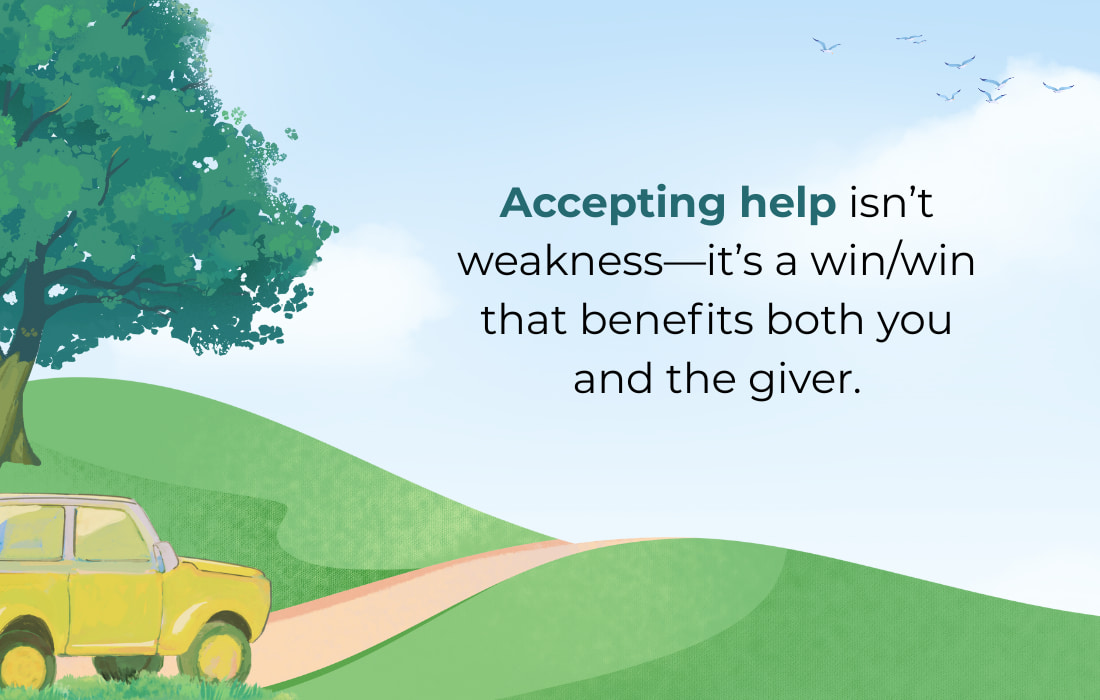
Common Questions About Removing Money Blocks
What are the biggest money blocks that hold people back?
The biggest money blocks that hold people back often include beliefs such as “money is bad,” “money doesn’t buy happiness,” and “I will never have enough money.”
Other common blocks are “I don’t deserve success,” “wanting more money is selfish,” and the notion that “I am bad with money,” all of which limit one’s potential for financial growth.
Why is understanding my money story important?
Understanding your money story is important because it helps you identify the money blocks that may be holding you back from financial success.
By examining your past experiences and beliefs related to money, you can uncover patterns that limit your potential. Then you can create effective strategies to overcome them.
Can a limiting belief affect my finances?
Limiting beliefs about money can significantly impact your finances by preventing you from learning essential tools and strategies for success.
These beliefs often diminish your confidence and make you feel powerless when it comes to creating wealth and financial stability. When you hold onto a money block, it not only affects your mindset but can also hinder your ability to take proactive steps, such as budgeting, saving, or pursuing new income opportunities.
How do I know if my money beliefs are helping or hurting me?
The easiest way to determine if your money beliefs are helping or hurting you is to reflect on your early programming around money.
Consider the messages your parents or caregivers conveyed about money during your upbringing. What beliefs were instilled in you?
Analyze how these beliefs have influenced your financial habits today.
- Do you have a healthy amount of money?
- Are you saving and investing wisely?
- Do you believe in your ability to create more wealth?
- Can you comfortably say, “I deserve more wealth”?
Evaluating these questions can help clarify whether your beliefs are serving your financial well-being or holding you back.
Why do I feel like I never have enough money, and how can I change that?
Feeling like you never have enough money often stems from a scarcity mindset, where you focus on lack rather than abundance.
The first step to changing this perspective is to recognize and acknowledge that you feel this way. Next, explore where you might have learned this belief. Then, question whether this belief is a fact and if it’s truly 100% accurate.
Look for examples in your life where you do have enough money, and actively reinforce those positive experiences.
Remember, this transformation won’t happen overnight, but over time, you’ll start to notice that this feeling loses its grip on you. Incorporate tools like affirmations, visualization, and meditation to help reprogram your mindset and cultivate a more positive relationship with money.
How can a money block affect my relationships?
A money block can significantly impact your relationships, often in ways that are not immediately apparent.
Unfortunately, society doesn’t prioritize open discussions about money, leaving many couples navigating their financial lives without a clear understanding of each other’s beliefs and values.
Since money blocks tend to be subconscious, they can subtly influence your decisions regarding finances without you even realizing it. Money serves as a crucial currency of exchange in our daily lives.
Without addressing these underlying issues, it’s like having a hidden stinger in your relationship—capable of causing unexpected pain when triggered. Open conversations about money can help mitigate these issues and foster a healthier financial dynamic between partners.
How do rich people think differently about money and money blocks?
Rich people often think differently about money and money blocks than those with less financial abundance.
However, it’s important to note that they can still experience their own money blocks—especially if they inherited their wealth rather than earned it themselves. Individuals who “fell into” money may struggle with feelings of intense guilt and a lack of financial knowledge.
This can hinder their ability to spend money in ways that truly align with their values and priorities. So even “rich” people can feel undeserving of money and even afraid of running out of money, so they don’t allow themselves to spend.
In fact, it’s quite common for the wealthiest among us to worry about running out of money. It’s important to clear up your money blocks at all levels of wealth if you want to enjoy a life of abundance.
What are subconscious money blocks?
Subconscious money blocks are blocks that we’re not aware of.
Since society typically discourages open discussions about money, these blocks often go unrecognized and remain dormant. However, just because they’re not at the forefront of your mind doesn’t mean they don’t impact your decisions.
Their influence can manifest in limiting behaviors, fears, and choices that obstruct your financial growth. Until you actively choose to explore and address your money mindset, these subconscious blocks will continue to shape your relationship with money in ways you may not even realize.
Quick Video: 3 Manifesting Phrases for Money
Having the right money mindset allows you to believe and focus on what you desire. But even wealthy people can feel worried or stressed about money. So what can you do about it? These are three manifesting phrases that I use frequently to shift my mindset around money if I’m struggling with a feeling of lack.
Every Small Shift Makes a Difference
Every small shift in your mindset creates ripple effects in your life.
The moment you start questioning old beliefs and replacing them with ones that serve you, you’re already rewriting your money story.
So here’s your next step: pick just one of the six keys we covered today and put it into practice this week.
Whether it’s writing down your goals, practicing gratitude each morning, or taking ten minutes to visualize the life you want, start now.
The sooner you act, the sooner you’ll open the door to endless abundance.
You deserve it. So go get it!
Get the Free Guide and Audio Meditation for Manifesting Your Dreams
Pop your email address in the form below to get my easy checklist and guide to manifesting and the guided audio meditation to help you get started.
You’ll also get one or two emails per month with the latest blog posts about abundance, wealth-building, manifesting, and creating a fulfilling life.
Read More:
💎 12 Big Money Blocks Even the Rich Have and How to Reverse Them
💎 5 Ways to Attract Money and Live More Abundantly
💎 How to Attract an Abundance of Money: Mindset Shifts and Affirmations that Work
About the Author

TIFFANY WOODFIELD is a financial coach, cross-border expert, and the co-founder of SWAN Wealth based out of Kelowna, BC. As a TEP and associate portfolio manager, Tiffany has extensive experience working with successful professionals who want to leave a legacy and enjoy an adventurous, work-optional lifestyle. Tiffany combines extensive knowledge from her background as a financial professional with coaching and her passion for personal development to help her clients create a unique path that allows them to live their fullest potential. Tiffany has been a regular contributor to Bloomberg TV and has been interviewed by national and international publications, including the Globe and Mail and Barron’s.